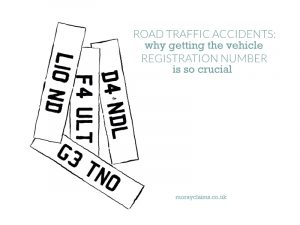If you have been injured as a result of a road traffic accident, although it is the driver of the vehicle at fault for the accident who bears the blame, it is their insurance company that will pay your compensation in most cases. As a result, you and your solicitors want to find out as quickly as possible who those insurers are and how best to contact them. There is a lot of information you can usefully gather to give to your solicitor following a road traffic accident but what do you think is the single most important piece of information? What you absolutely want to get if you can is the registration number of the vehicle which caused the accident. This applies whether you were In the “best case”, you will be well enough and quick-witted enough to get the registration number yourself. But that won’t always be the case, especially if you have been seriously hurt in the accident. In this article, we will look at three reasons why getting the registration number Continue Reading
How Grigor & Young help you with an accident-on-premises claim in Moray
Grigor & Young LLP, Solicitors, use Moray Claims as a trading name in their business of dealing with personal injury compensation claims for clients. Grigor & Young have offices in Elgin and Forres, Moray. Claims arising from accidents on premises are usually against the person or business which has control over the land or buildings in question. Injuries resulting from accidents on premises – also known as occupiers’ liability claims – can result in a wide variety of ways. If we take on your claim at G&Y, it will be via one of the following three funding methods. Legal aid Your eligibility for legal aid depends upon your financial circumstances. If you qualify for legal aid, we will look closely at using that as the funding mechanism for the claim though we will also discuss with you the other options mentioned below. It is worth noting that, if your claim is successful under any form of Scottish legal aid, you will receive 100% of your Continue Reading
How Grigor & Young help you with a road traffic accident injury claim in Moray
Grigor & Young LLP, Solicitors, use Moray Claims as a trading name in their business of dealing with personal injury compensation claims for clients. Grigor & Young have offices in Elgin and Forres, Moray. Personal injury compensation claims arising from road traffic accidents are usually against insurers of the driver who was to blame for the accident. If that driver was uninsured or is untraced, the claim may be against the Motor Insurers' Bureau. Injuries resulting from road traffic accidents can happen in many different ways. If we take on your claim at G&Y, it will be via one of the following three funding methods. Legal aid Whether you qualify for legal aid depends upon your financial circumstances. If you qualify for legal aid, we will give close consideration to using that as the funding mechanism for the claim though we will also discuss with you the other options mentioned below. Note that, if your claim is successful under any form Continue Reading
How Grigor & Young will help you with your accident at work claim in Moray
Moray Claims is a trading name of Grigor & Young LLP, Solicitors. Grigor & Young have offices in Elgin and Forres, Moray. Accidents at work cover a wide range of accidents. If we take on your claim at G&Y, we will do so in one of three ways. Legal aid Eligibility for legal aid will depend on your financial circumstances. If you qualify for legal aid, we will give serious consideration to using that as the funding mechanism for the claim but we will also discuss with you the other options mentioned below. Note that if your claim is successful under any form of Scottish legal aid, you will receive 100% of your compensation. The legal aid rules prevent your solicitor taking any form of Success Fee as a deduction from your compensation. "Before the event" (BTE) insurance This is a type of legal expenses insurance which you may have attached to buildings or contents insurance, for example. Many people have this type of legal expenses insurance cover Continue Reading
